How many Penn students go into finance and consulting?
The DP examined Career Services data for students entering financial services and consulting after graduation
ANMOL DASH, JIN KWON, AND SINA SHAIKH Staff Reporters
The DP examined Career Services data for students entering financial services and consulting after graduation
ANMOL DASH, JIN KWON, AND SINA SHAIKH Staff ReportersOne day before the event, criticism continues to erupt over Penn’s response and remarks by some speakers described as antisemitic
Reporters Staff ReporterOne day before the Palestine Writes Literature festival begins, controversy continues to percolate over some speakers' alleged antisemitic remarks
— and Penn's response.
After Penn President Liz Magill and other administrators released a statement on Sept. 12 about the upcoming festival, students, local organizations, and faculty members responded in a variety of ways.
Many have supported Magill's denunciation of antisemitism, while others pushed back against the University's decision to speak out.
The festival, which starts Friday, celebrates itself as the "only North American literature festival dedicated to celebrating and promoting cultural productions of Palestinian writers and artists."
Pushback against the event — primarily among
Kozuma previously served as the executive director of College Houses and Academic Services since 2021 MEHREEN
Over 100 days into his tenure as the vice provost for University Life, Hikaru “Karu” Kozuma sat down with The Daily Pennsylvanian to discuss his vision for his new role.
Kozuma — who was announced as Penn’s next VPUL in February — began his position on May 1. As VPUL, he supports staff and students across 16 different departments, including the Office of Fraternity and Sorority Life, Platt Student Performing Arts House, and Penn’s seven cultural centers.
Kozuma said that one of his goals for his first year in the role was to set a new direction for University Life, adding that he hopes to create a pathway that aligns both with student needs and Penn’s goals.
“[I hope to] to build support for students and the staff on what is needed when they’re trying to meet their academic passions, pursuing their co-curricular goals, or just trying to find a community,” Kozuma said.
Kozuma previously served as the executive director of College Houses and Academic Services since 2021. He succeeded Mamta Accapadi, who resigned after two years in the VPUL role last June. Prior to Kozuma’s appointment, Senior Associate Vice Provost for Student Affairs Tamara Greenfield King served as interim vice provost for University Life.
Previously, Kozuma — a 2015 graduate of Penn’s Graduate School of Education — served as associate vice provost for University Life and executive director of the Office of Student Affairs from 2010 to 2018. Kozuma also served as Amherst College’s chief student affairs officer between 2018 and 2021.
Kozuma was appointed following a six-month search that began in late August 2022 when Interim Provost Beth Winkelstein announced the formation of an advisory committee to select the next vice provost for University Life. The committee was made up of 14 Penn faculty and student government representatives.
In regards to his new role, Kozuma emphasized getting to know individuals on a personal level, and he added that this approach was crucial when supporting marginalized communities on campus.
“I think we need to know and understand the multiple levels of what’s going on, both defined by them, things that the community wants to celebrate, highlight, enhance, and also maybe some of the challenges that they are facing,” he said.
Expanding on his priorities, Kozuma said that he plans to further his understanding of the diversity of students’ needs by engaging with and centering student voices. He added that maintaining long-term relationships with students is important to him since the needs of communities can evolve.
Before Kozuma assumed the VPUL role, University Life developed several strategic priorities, including intercultural dialogue, alliance for understanding, social justice peer educator training, cultural and heritage celebrations, and expanding emergency and opportunity funding. Kozuma told the DP that he will work alongside the University Life departments to determine whether these strategic priorities fit present needs or need to be altered to reflect student needs better.
“A lot of it really will be dictated by the people who are the experts and working with individuals,” he said.
However, Kozuma said that dialogue between students and staff members is what he aims to emphasize most in his new role.
Before coming to Penn in 2010, Kozuma was director of Residential Programs at Columbia University and worked at Middlebury College. While he initially intended to become a physician, he said he decided to take a gap year and work at Middlebury. He said his career aspirations shifted during this time, and he realized he wanted to work in higher education.
“As one sort of dream was fading, another one was taking more of a solid form,” he said.
Throughout the year, Kozuma told the DP he will strive to get to know students by attending events and programming and providing advice or guidance to students seeking his support.
“It really does invigorate me thinking about working with students,” Kozuma said. “I want to get to know who they are and also get to know who they become.”
students, alumni, and national Jewish groups — has centered on some speakers' previous statement.
The speakers include Pink Floyd co-founder Roger Waters who has an extensive history of denigrating Jewish people, according to the United States State Department. Another speaker, Professor Marc Lamont Hill, apologized in 2018 after he faced criticism for saying he supported “a free Palestine from the river to the sea” – described by some as a call to destroy Israel. Other, however, say that these events have been taken out of context and cannot be
Penn graduates enter financial services and consulting industries at higher rates than any other Ivy League university — and the numbers are ticking up.
According to an analysis of Ivy League postgraduate outcome surveys by The Daily Pennsylvanian, 50% of Class of 2022 graduates pursuing full-time employment went into finance or consulting jobs, compared to the next-highest rate of 40% at Harvard University.
The rate of graduates from Penn’s College of Arts and Sciences going into finance or consulting — 47.5% in 2022 — remains higher than all recorded data from other Ivy League schools. In the same year, Penn's School of Engineering and Applied Science alone sent 34% of its full-time job-seeking graduates to those two industries — a higher rate than Cornell University, Columbia University, or Yale University.

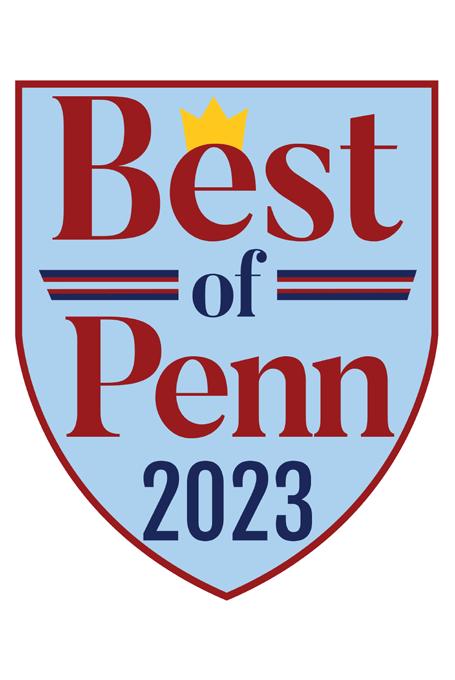
Penn’s overall rate of full-time job seekers entering finance or consulting has topped other Ivies since 2018, the first year for which the postgraduate outcome reports were available from Career Services.
Wharton senior Erin Feng said there are several factors at Penn that may contribute to the high rate of postgraduate career outcomes in finance and consulting.
“In the social scene … the clout within clubs is pretty pronounced,” she said. “All we see are these massive clubs that are all finance and consulting related — and those are two buzzwords I think every underclassman would say that they have heard millions of times.”
The massive presence and competitive nature of
Hangry Joe’s serves a mix of Nashvillestyle chicken fingers, Korean fried chicken, and boba
DAVID ZHANG Staff ReporterHangry Joe’s Hot Chicken & Wings opened a location near Penn's campus on Tuesday, replacing Greek restaurant Yiro Yiro.
Hangry Joe’s — whose University City store is located at 125 S. 40th St. — serves a mix of Nashville-style chicken fingers, Korean fried chicken, and boba. The fast-casual restaurant chain currently has over 40 locations in the United States. and two overseas locations in the United Arab Emirates and
South Korea. Hangry Joe’s first Philadelphia location is located at 300 Market St.
The chain’s signature product is its multi-level spicy fresh chicken, which features six spice options ranging from no seasoning to “angry hot.” The spiciest level requires customers to sign a waiver before tasting.
Joe Oh, who identified himself as the founder of Hangry Joe’s, told The Daily Pennsylvanian that his store has been popular among college students. He said trying out the spicy chicken has become a social activity for younger customers.

“We first started on the campus of James Madison University," Oh said. "Our chicken is popular among the young people — they like to take pictures and post them on Instagram."

Hangry Joe’s also offers a collection of milk tea, fresh tea, and smoothies, according to Oh. Other menu items include chicken and waffles, chicken bites, and waffle fries.
The restaurant's University City location comes amid a push for more franchising. Hangry Joe's
Oct. 23 is the last day for Pennsylvanians to register to vote ahead of November’s election
PAIGE RAWISZER AND NINA DILWORTH Staff Reporter and Senior ReporterPenn student groups celebrated National Voter Registration Day with tabling events on Tuesday. Penn Leads the Vote, Penn Democrats, and the Asian Pacific Student Coalition each held events on Locust Walk to encourage students to register to vote.
The registration deadline in Pennsylvania is Oct. 23 ahead of the Nov. 7 election, in which registered voters will elect various state judicial candidates as well as a new mayor of Philadelphia and City Council members.
After helping students check their voter registration status, register for the first time, and request mail-in ballots as necessary, Penn Leads the Vote provided students with shirts and food donated by community retailers on College Green.

Co-Director of Penn Leads the Vote and College senior Elizabeth Ford said the high availability of polling locations on Penn’s campus is a reason why students should engage in voting.
“We’re really privileged to have the access to voting that we do — we have several polling places on
campus, which is a unique position to be in,” she said.
“Many people have barriers to voting, whether that be having to get on public transit, or working all day, but Penn students have the luxury of walking just a few steps to Houston Hall or to ARCH to cast their ballots.”
Furthermore, Ford added that college years are a formative time, and hopes to develop consistent voting habits now so that Penn students “will be engaged citizens for life.”
Ben Jurutka, the political director of Penn Dems and a College senior, told The Daily Pennsylvanian that the student organization has been in contact with National Voter Registration Day — the organization behind the annual event — to coordinate outreach. The organization provided Penn Dems with stickers to hand out to voters, which Jurutka noted seems to be encouraging.
According to Jurutka, this is the third voter registration event that Penn Dems has hosted this semester, with a fourth planned for October. APSC and Asian Pacific Islander Political Alliance
tabled outside of Steinberg-Dietrich Hall and offered a boba voucher to students who registered to vote.
“I believe it is really important to encourage people to vote and make the process exciting,” APSC member and College sophomore Avia Weber wrote to the DP. “By offering boba, a college staple, I believe that APSC has great potential to increase voter registrations among college students because we all know that college students love free things.”
Penn College Republicans Political Director and College sophomore Peter Kapp told the DP that while they recognize the importance of voting to uphold democracy, he believes that students should remain registered in their hometowns.
“We vote to offer our input on the societies in which we have a vested interest, so to register in the swing state of Pennsylvania for an electoral advantage is antithetical to our democracy,” Kapp wrote in a statement.
Senior reporter Dedeepya Guthikonda contributed reporting.
Penn Leads the Vote and Penn Dems were among the various political clubs setting up booths around campus on Sept. 19
classified as antisemitic.
In their statement, administrators acknowledged speakers who "have a documented and troubling history of engaging in antisemitism by speaking and acting in ways that denigrate Jewish people."
"We unequivocally — and emphatically — condemn antisemitism as antithetical to our institutional values. As a university, we also fiercely support the free exchange of ideas as central to our educational mission," the administrators wrote. "This includes the expression of views that are controversial and even those that are incompatible with our institutional values."
The administrators' statement — which said the event was not organized by the University — was the first in recent memory to respond to criticism of a campus event. Since then, dozens of groups and community members have weighed in.
Penn Hillel Penn Hillel announced a campuswide show of support for Jewish students and demanded further University action amid growing controversy over a Palestinian literature festival.
As part of its ongoing response to the festival, Penn Hillel is planning a "massive" Shabbat Together event tomorrow at 7:30 p.m. aimed at promoting unity on campus, Penn Hillel Executive Director and Rabbi Gabe Greenberg wrote in a letter to the organization's mailing list on Sept. 14.
"Prominent politicians and Penn alumni will be coming to celebrate along with hundreds of students, to show — contrary to what antisemites like Roger Waters would have us believe — that Jewish Penn students will NEVER stop showing their pride in Israel, their Jewish identity, heritage, and beliefs," Greenberg wrote.
In addition to hosting the Shabbat Together event, Greenberg said Penn Hillel would join other campus groups in hosting a food giveaway on Sept. 24 prior to Yom Kippur. He also promised additional actions to come, including "bringing in big-name speakers on the issues of fighting antisemitism, Jewish pride, and the Israeli-Palestinian conflict." Greenberg called on the event's Penn-affiliated sponsors and partners to remove their logos from the festival website and condemn antisemitic remarks made by individual speakers.
The letter was accompanied by a statement posted on Penn Hillel's Instagram, where the organization wrote that it would continue to meet with administrators to increase support for Jewish life.
"Penn Hillel students and staff have met, and will continue to meet with high-level University administrators to ensure that Penn takes seriously its legal and ethical responsibility to address and call out antisemitism whenever and wherever it occurs," the organization wrote.
Student affinity groups
Palestinian and Arab student affinity groups have pushed back against Penn's response to the upcoming Palestinian literature festival taking place on campus later this week.
Penn Arab Students Society, Penn Against the Occupation, and Almaydan — the Forum of Penn Arab Graduate Students — published a joint statement on Sunday, writing that Palestinian and Arab students were required to invest "a significant amount of time and energy to create opportunities for their communities to be celebrated," and the upcoming festival is "a long-awaited affirmation of their belonging and worth."
The student groups also wrote that the University's statement was "unprecedented," given Penn's alleged silence "when hateful and concerning views have been espoused by campus visitors and even faculty in the past."
"The statement is a stinging reminder that when the university fails to provide accurate representation and impartial advocacy, it is up to us, the students, to take charge of our own narrative, ensuring no student feels unheard, invisible, or grossly misrepresented," the affinity groups wrote.
On Sunday, Penn Chavurah — which describes itself as "an independent student-run space for progressive Jews at Penn" — issued a statement of support for Palestine Writes, accusing Penn Hillel and others of a campaign to "discredit and racialize" the festival.
"The fear-mongering messages recently sent to administration and alumni are the latest of Penn Hillel's attempts to silence Palestinian voices on campus, especially outspoken critics of Israel," Penn Chavurah wrote.
The organizers of the event, which include a Penn professor, have also condemned the
University's response.
Penn faculty members
Thirty-six Penn faculty members signed a letter in support of the festival, expressing “deep concern” about Magill's statement addressing escalating criticism of the event.
Literature and humanities professors sent the letter to University administrators on Sept. 17, calling for Magill to immediately amend the administrators' statement on the festival so that it clearly supports a diversity of views and communities on campus. The faculty members went on to describe the importance of welcoming a discussion on Palestinian literature and celebrating diversity through the festival.
"Your statement gives the impression that the entire festival could be seen as hosting views that you see as 'incompatible with our institutional values,'" the professors wrote.
A University spokesperson confirmed that Penn had received the letter but did not have further comments.
In the letter, faculty members also wrote that Magill’s statement does not make a clear enough "distinction between the affirmation of Palestinian rights, culture, and literature, and the practice of antisemitism.” They said that, as it stands, the statement gives the impression that the entire festival — the goal of which is to celebrate and promote Palestinian literature and art — opposes institutional values.
“It was very wrong, on many levels, of Penn’s administration to suggest that Palestinian literature, culture, and aspirations be conflated with antisemitism," Arabic and Islamic Studies professor Joseph Lowry told The Daily Pennsylvanian.
English and Comparative Literature professor
Max Cavitch said that he signed the letter to support the free discussion of the literature of all people and to express disappointment in what he said was Magill’s failure to meet her responsibilities as the steward of Penn's intellectual and societal missions.
“As a Jewish man myself, I find Magill’s vague insinuations of antisemitism both disingenuous and harmful to Penn’s national and international reputation,” Cavitch said. “Worse still, Magill’s comments risk alienating, demoralizing, and even endangering many of our University’s own students and faculty,
including those of Palestinian and Arab descent.”
Cavitch said that if Magill were to attend the conference rather than condemning it in advance, "she could learn more about Palestinians’ literary heritage."
In addition to condemning antisemitism, the faculty members condemned Islamophobia and the oppression of Palestinians in the signed letter. They wrote that Magill’s statement could make Palestinian students feel that the University does not support them.
Another signatory of the letter is Roger Allen, the former chair of Penn’s Near Eastern Languages and Civilizations Department, who said he was informed of the controversy surrounding the festival by professor Huda Fakhreddine, the current undergraduate department chair and one of the organizers of the festival.
Allen told the DP that the controversy surrounding the festival is demonstrating a larger issue where the phrase "antisemitic" is being used to describe criticism of the Israeli government or support for Palestine.
He said that while the University referenced the controversial statements made by people speaking at the upcoming festival, many have not acknowledged the treatment of Palestinians by Israeli leaders and the Israeli government.
Throughout the five decades that Allen spent teaching at Penn, he said that he has found that Muslim and Arab students at Penn have received minimal support and funding from the University compared to the Jewish community.
Allen said that the phrasing of Magill's statement highlighted a lack of equal support for the two communities because it reflected on the concerns of the Jewish community rather than beginning by stating the community’s obligation to listen to disparate points of view. He added that it seemed as though administrators were being influenced "by one of these two communities at the expense of the other."
The faculty letter also called attention to the significance that literature plays in helping people to engage in critical thought and understand complex issues.
“The arts should be a place where we can explore the challenges," Music professor Carol Muller told the DP. "Perhaps we have lost a sense of the value and work of the arts."
The repaving portion of the Walnut Street project is expected to continue through Sept. 29
 EMILY SCOLNICK
Staff Reporter
EMILY SCOLNICK
Staff Reporter
Thirty blocks of Walnut Street, including the area around Penn’s campus, will be under construction throughout September.
The repaving project, which stretches from 33rd Street to 63rd Street/Cobbs Creek Parkway, is run by the Pennsylvania Department of Transportation. The project began Sept. 12, and the street remained closed overnight through Sept. 15. The paving portion of the project will cause further closures later in the month, beginning with paving on Sept. 26.
House managers emailed residents of The Radian and Gutmann College House to advise them that they would hear “noise related to the milling machine, of grinding the asphalt and construction vehicles traveling on Walnut Street” from Sept. 12 to Sept. 15.
The Division of Public Safety also sent out memos about the construction to some tenants of Pennowned buildings. Additionally, DPS also informs Penn community members via Traffic Advisories, which are opt-in communications about traffic issues in the Penn area, adding that Penn affiliates can register for the DPS Traffic Advisory email.
The Daily Pennsylvanian spoke to some Penn community members who expressed confusion and frustration about the construction.
“I knew nothing about [the construction] before it started,” College junior Aspen van der Hoeven told the DP.
“The road was wrecked,” a Penn graduate student said. The student, who uses a wheelchair, said the construction and the lack of communication surrounding it made it difficult for her to travel across the street.
“If I didn’t have someone helping me through getting from one sidewalk to the other, I wouldn’t have been able to do it,” she said. “When I was crossing the road, my wheelchair broke [because of the rough pavement]. That is the kind of thing that is prone to happen when you have those unsafe conditions.”
The construction has also been bothersome for college house residents, both during the day and in the overnight hours.
“When I go down and I’m sitting in the study spaces, I hear it, and I hear it as soon as I leave the building, especially on the street side and not the campus side,” van der Hoeven said.
Van der Hoeven added that she would have appreciated more of a heads up from the University.
“I understand that it’s construction and needs to happen, but it affects everybody who lives in Gutmann,” she said.
The Penn graduate student agreed that more notice would have been appreciated.
“Penn could have sent a memo to everyone saying the roads are getting fixed,” she said.
A release from the City of Philadelphia on Sept. 11 details the outline of the project, including that Walnut Street will be repaved and repainted, and a new bike lane will be created throughout the fall. According to the release, Walnut Street is currently labeled as a “Vision Zero High Injury Network corridor,” which means that there is a “higher rate of severe traffic crashes than the average Philadelphia street.”
According to Matt Cassidy, the communications manager for the city’s Office of Transportation, Infrastructure, and Sustainability, the project will calm traffic and increase pedestrian safety.
Cassidy told the DP that this area has had 331 crashes from 2018-2022, with 214 injured, 15 seriously injured, and 3 killed.
“Nearly 45% of those total crashes were due to aggressive driving,” Cassidy wrote.
The Walnut Street project is based on a similar project that took place on Chestnut Street in 2017. The Chestnut Street project reduced injuries by 40% and significantly reduced the number of crashes.
The repaving portion of the Walnut Street project is expected to begin on or around Sept. 26 and continue through Sept. 29.
The initiative will give students the opportunity to take advantage of Wharton’s resources to further their understanding of how to use AI and apply it in the business world
“AI brings a host of new questions that analytics probably didn’t ask to the same degree, including things like ethics, jobs, and the role of religion and humanity,” Tambe said. “Given the amount of intense interest in AI, especially in the business community, we thought there would be an opportunity to really focus on some of these things.”
Tambe explained that the role of co-director entails figuring out where the center can add value to the AI community.
“Part of [the role] as a faculty co-director is also thinking about the initiative and how to serve these different communities of students, researchers, [and] academics effectively” Tambe said.
Purk spoke about the differences between the business impact of AI and the human impact of AI.
“We have discovered that you can’t look at the business applications of AI without understanding the human impact of AI with those applications,” Purk said.
According to the announcement, one of the main focuses of the initiative is how to adopt a human-andmachine mindset, or learning how to combine the different capabilities of both humans and AI to help make meaningful changes to society.
“People really have to think and decide where they’re going to put their resources. AI is not going to tell you where to do that. You still have to think about where you’re going and what you want to solve for,” Purk said.
The initiative also emphasizes the idea of humans working with AI to solve problems.
The repaving project on Walnut Street, run by the Pennsylvania
of Transportation, stretches from 33rd Street to 63rd Street/Cobbs
finance and consulting clubs at Penn have been an ongoing topic of discussion over the years. To alleviate this competitiveness, some clubs such as the Wharton Undergraduate Finance Club and the Wharton Marketing Undergraduate Student Establishment have created events and spaces where anyone can participate, regardless of application results.
Additionally, Feng said she has noticed administration trying to address this homogeneity in career pursuits by promoting “more diverse roles, whether that’s increasing the concentrations or bringing in a lot of guest speakers.”
“As you get into junior and senior year,” Feng said, "I think people start to diversify from there.”
Even excluding Wharton students, students at Penn still tend to go into finance and consulting at high rates, with a percentage equivalent to that of Harvard’s in 2022: 40%. This rate has increased slightly in the last five years, mirroring Penn’s overall increase in the rate of full-time job seekers entering finance or consulting.
“I think Wharton has a very big influence on many things that people do on campus,” College junior Michael Li said. “[There is a] pervading culture at Penn where you tack on a business thing, even if you're not majoring in business, for a more practical application.”
Li added that in general, the “allure of mystery” in industries such as consulting coupled with the idea of money can be “very attractive for some people,” especially students who are undecided about their career paths.
Past data show that the dominance of finance and consulting at Penn has been consistent from 2011 to 2018, and the top career paths for Penn graduates have remained the same in the last five years as well. Even accounting for students who pursue higher education or are otherwise without
a full-time job, graduates with positions in finance or consulting made up 36% of all recorded student outcomes in 2022.
The pattern of outcomes has remained fixed, with finance, consulting, continued education, technology, and health care being the most common by far. The next most common industries tend to be education, nonprofit, and media, journalism, and entertainment, but these industries each make up around 5% or less of the industry composition.
“The industries Penn students tend to go into have remained quite consistent,” Executive Director of Career Services Barbara Hewitt said, noting that the slight increase in finance and consulting employees from Penn could relate to companies beginning to recruit earlier in the year.
Consulting and financial services firms often recruit on campus for students from all Penn schools.
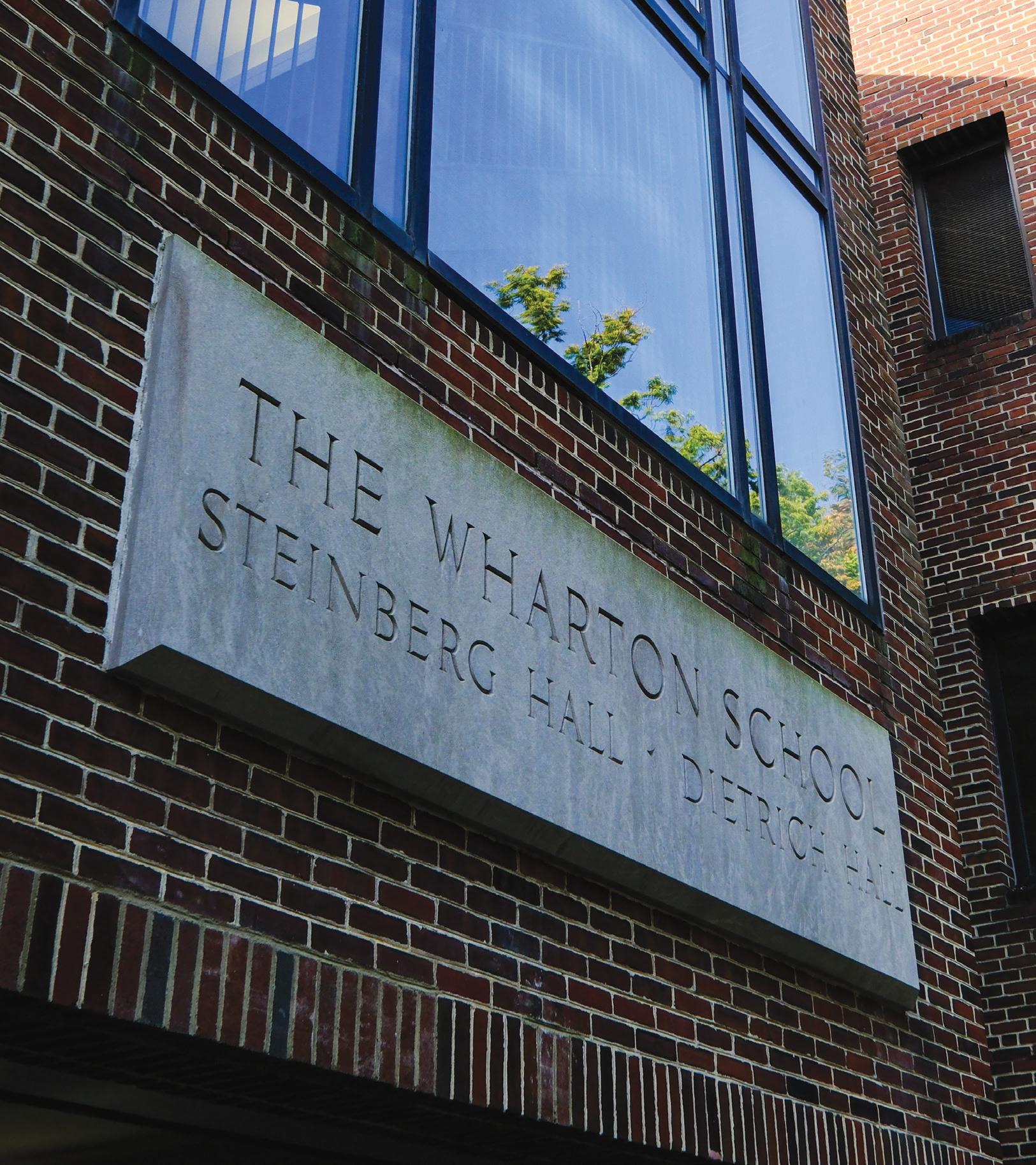
Class of 2022 graduates in certain majors — especially in the College and the Engineering School — reported above-average outcomes in consulting and financial services compared to the past five years of data.
For example, 65% of full-time jobs among cognitive science graduates in Class of 2022 entered these fields — 24% above the average of the past five graduating classes. Other majors that have seen an uptick include communications, English, and environmental studies.
Hewitt said that some fields have different timelines than others, which could impact the data.
“They're kind of telling students why their opportunities are attractive earlier,” she said of consulting and financial services firms. “There are many things you can do with a Penn education, and the timelines are going to differ. That's the stuff that I think is important for students to think about."
website says that it will be opening several additional locations soon, and the chain offers multiple franchising opportunities.
College sophomore Steven Su said that he has enjoyed Korean chicken wings since he was young. He said he is delighted to see another chicken store open near campus.
“I look forward to trying out the most spicy
chicken sandwich with friends,” Su said.
Hangry Joe’s, which is open from 11 a.m. to 11 p.m. seven days a week, is the latest of the recent changes in food and beverage options in University City. It joins Gong Cha and Playa Bowls as new options for the surrounding community and offers another fried chicken option in light of Wishbone Chicken's sudden closure in February.
society as a whole, according to the announcement.
The initiative will give students the opportunity to take advantage of Wharton’s resources to further their understanding of how to use AI and apply it in the business world. According to the AI at Wharton website, the program focuses on two specific areas guided by already-existing initiatives: Wharton AI & Analytics for Business and Wharton Impact of Technology Initiative.
The creation of AI at Wharton comes after AI for Business and Wharton Customer Analytics recently merged to create the expanded Wharton AI & Analytics for Business program in January.
Wharton AI & Analytics for Business Executive Director Mary Purk will serve as the executive director of Analytics at Wharton. Purk is joined by four Wharton faculty co-directors: Operations, Information, and Decisions professors Kartik Hosanagar and Prasanna Tambe and Marketing professors Robert Meyer and Stefano Puntoni.
The Daily Pennsylvanian spoke with the leaders of the new initiative about its relationship to analytics and its business applications.
“So how do you get AI and [humans] to be able to work well together? Businesses should be using AI and they should be using people, and they should be using them together,” Tambe added.
As Penn does not have a University-wide policy on AI use in the classroom, Purk explained that professors are going to start changing their expectations of students with the introduction of generative AI in the classroom.
“Professors are going to expect your answers to be more robust, because you have just so much technology at your fingertips,” Purk said.
Wharton and Engineering senior Keshav Ramji participated in AI and Analytics for Business’ Analytics Accelerator Summit in 2021, which pairs students with companies to solve problems using machine learning and AI. Ramji explained the future applications of AI in student learning and its business capabilities.
“AI for business has been around for a few years now, but making it a cornerstone of what the Analytics and AI at Wharton has been about is very new,” Ramji said.
use AI and apply it in the business world.PHOTO BY ANNA VAZHAEPARAMBIL Department Creek Parkway.
A RIANE AMONG MEN | Musk’s reconfiguration of X is to blame for its downfall, not the Jews
Since 1997 College and Wharton graduate
Elon Musk’s acquisition of X (formerly known as Twitter) last October, the platform’s advertising revenue has plummeted by nearly half. After purchasing the app for $44 billion, it is now worth only approximately $15 billion a year later — a third of its original value.
Referring to himself as a “free speech absolutist,” Musk’s main objective with X was to reshape the app into a digital town square characterized by minimal censorship — a space where nothing would be off limits for users.
Rolling back on moderation standards, however, didn’t create the appealing oasis for free expression that Musk envisioned. Advertisers were quickly alienated while Musk invited back suspended users such as Ye and Donald Trump, engaged in chaotic staffing cuts, mandated harsh work conditions, and propagated various conspiracies. Companies jumped at the opportunity to create their rival versions of X, and users jumped at the opportunity to download these alternatives; Meta’s nascent app Threads had 70 million people register within the first two days of launching.
Adverts comprise 90% of the company’s revenue, making the state of X’s advertising pivotal to its success. But since Musk’s takeover, X has produced an incessant cesspool for hate speech, causing companies — specifically high-paying advertisers — to
abandon the app as both safety and trust have progressively eroded. X is experiencing unprecedented levels of hate speech since the acquisition.
The shift in content moderation prompted anti-hate groups such as the Anti-Defamation League to scrutinize the app’s surge in hate speech and content moderation policies. Over a century old, the ADL is the leading Jewish organization advocating for civil rights and combating all forms of antisemitism or bias by outwardly challenging bigotry when it arises.
This past May, the ADL published a piece analyzing the “threads of hate” on X, revealing a normalization of harmful ideologies without regulation. Instead of assuming responsibility for driving X into the ground since purchasing it almost a year prior, Musk began scapegoating the widely respected Jewish civil group for a 60% drop in ad revenue after they rightfully illuminated the rise in hate speech on the platform.
Although Musk chose to single out the ADL specifically, it is not the sole organization to scrutinize Musk’s decisions on the app: The Southern Poverty Law Center also has released statements denouncing Musk’s courses of action as the new proprietor among many organizations and research institutions censuring Musk’s laissez-faireabsolutist speech policies.
By choosing to engage in a public feud with a Jewish organization, Musk is opening the floodgates for white nationalists to justify antisemitic discourse. Musk’s allegations, which then spawned the dog whistle campaign #BantheADL, were enthusiastically embraced by antisemites, conspiracy theorists, and white supremacists alike. Ironically, Musk is now legitimizing the ADL’s very critiques of the app’s lack of content management.
As one of the wealthiest, most influential figures in the world, Musk’s amplification of the hashtag #BantheADL poses great dangers to the Jewish community. To make his intent clear, he engaged with a white supremacist’s tweet of the hashtag.
Consistent circulation of conspiracies, archetypal tropes, and blatant discrimination normalize antisemitism, increasing comfortability in expressing these views as they are reinforced by high-profile figures like Musk to justify their bigotry. By attributing his company’s flaws to Jews, Musk is reviving old tropes used to justify antisemitism, positing Jews as villains in power controlling the media and banks behind-the-scenes. These recurring nodes of hate are similar to sentiments spewed by Ye on the app last year, and analogous to classic antisemitic conspiracy theories disseminated during World War II.
But the fact of the matter is, speech is
generative of action. In the digital age we are in, dialogue across social media inherently proliferates into societal frameworks, and people look to influential figures to empower their beliefs — much like how white supremacists cited Ye last year. Antisemitic incidents are skyrocketing in the United States, and researchers find that antisemitic content on platforms like X only instigate such behaviors. Since the buyout, the volume of antisemitic tweets have increased over twofold within the unrestrained forum.
Musk stands as the exclusive source behind X’s demise, yet instead of assuming responsibility for the decline in users and ad revenue, he is deflecting blame against a Jewish organization. This not only appears hypocritical from the free speech lens he advocates for, but it also seems like a method to preemptively divert and reshape the storyline surrounding Musk’s involvement with X — especially in case of company failure under his poor management.
RIANE LUMER is a College senior studying political science and journalistic writing from Huntingdon Valley, Pa. Her email address is rlumer@sas. upenn.edu.
ISKRA (THE SPARK) | Women and feminism are having a moment. Or are they?
"Barbie" will cap off its 10th week in the box office’s top five this week after earning over $1.4 billion worldwide, making it the 14th highest-grossing movie of all time. Even prior to its release, "Barbie" assumed a polarizing cultural cachet due to its treatment of feminism, womens’ issues, the patriarchy, and representation. That attention only exploded after the movie hit theaters, with conservative pundit Ben Shapiro burning Barbie merchandise while much of the internet fawned over the film’s feminist messaging.
After recently watching the movie, I left the theater wholly confused as to what the controversy consisted in. To the demerit of both sides, I struggled to find any groundbreaking feminist moments that could have ignited cultural conservatives’ incendiary backlash and ubiquitous accusations of wokeism.
For example, America Ferrera’s monologue about the contradictory expectations embedded in womanhood read off like an early second-wave feminist diatribe. What then about the "Barbie" movie was supposedly so radical? Admittedly, not much. The most subversive statement of the movie was when Barbie confidently proclaims to her literal maker, Ruth Handler: “I want to be a part of the people that make meaning, not what’s being made.”
Yet, does Barbie — or woman — really escape her place as what’s being made? We must acknowledge and reckon with the fact that the Barbie movie was co-produced by Mattel, the parent company which owns and makes Barbie, the brand. With that in mind, it's impossible not to view "Barbie" through a lens tinted by commodification and profit incentives.
And if radical feminism is so palatable as to be profitable, is it still radical? Of course, "Barbie" doesn’t need to be radical and there is merit in using a culturally intelligible brand as a vehicle to popularize feminist themes.
To this point, Barbie has served as an important microcosm for feminist discourse during the last 75 years. However, Barbie remains a piece of plastic — not a woman — and this is crucial to understanding why the positioning of Barbie is harmful. Allowing Barbie to remain at the center of the cultural
conversation around feminism means we have granted Mattel (a multi-billion dollar corporation) the ability to define, and delimit, what a woman is.
Even though it seems obvious that Barbie is a product, ‘she’ is treated as so much more and has been embroiled in controversy since ‘her’ initial release. ‘She’ was charged with perpetuating gendered stereotypes which portrayed women as “sex objects or housekeepers;” ‘she’ came under fire for promoting unhealthy body types and negatively influencing girls’ body image; ‘she’ found ‘herself’ in hot water for being white and not inclusive of our diverse society. And so on.
Representation is critical for how we interpret and in turn construct our own selfhood and identity. By placing so much emphasis on how Barbie represents women, we have implicitly allowed Barbie (and, by extension, Mattel) to define what a woman is — or can be. In an ever-changing world, where marginal identities are increasingly coming into the fore, this is a dangerous game of cat and mouse in which what counts as womanhood is being interpreted by a corporation. The question “what is a woman?” is strictly answered by another, far more important, question to Mattel: “what is profitable?” In this sense, Barbie — and woman — is still being made, even if women understand themselves as taking a newly active role in that process. It then becomes clear that no matter how many self-deprecating, satirical moments about Mattel were woven into the "Barbie" plot, the capitalization and commodification of feminism is highly problematic and potentially dangerous. Aside from the pure content of the "Barbie" movie, the status it has assumed in our culture (women breaking up with their boyfriends over it, liberals using it as “a litmus test for healthy masculinity,” etc.) is instead what should be under scrutiny lest we should allow Barbie (read: Mattel) to maintain its chokehold on the representation of womanhood.
Read the rest at thedp.com.
VINAY KHOSLA is a College junior studying English and political science from Baltimore. His email is vkhosla@ sas.upenn.edu.
DESIGN BY JANINE NAVALTALEXI’S TAKE | The unsung narrative of this summer’s female-led pop culture moments
It was virtually impossible to avoid the hyper-feminine content that dominated the internet and media writ-large this summer. From the blockbuster debut of “Barbie” to Taylor Swift’s record-breaking Eras Tour, anti-patriarchal narratives seemed to be everywhere that you turned. Whether it be the famous “f**k the patriarchy” lyric shouted during Taylor Swift’s “All Too Well” (10 Minute Version) or Barbie’s Ken-free Dreamhouse, this media seems to be selling young women a dose of female empowerment that rivals Betty Friedan’s greatest works.

Nevertheless, while I was participating (gladly) in the summer we all turned pretty, I was simultaneously learning about the fate of American civil society and the most important indicator of that — the birth rate. I took a class with American Enterprise Institute senior fellow Tim Carney, who in his writings often cites the decline in birth rate as indicative of broader problems in America. He is right that with the birth rate well below replacement, at 1.64 births per woman in 2020, the United States won’t sustain its current demographics. It is also reflective of a growing sentiment among young women to opt not to have kids, which seems to track with a similar decline in marriage.
All that said, you are likely wondering, what exactly does Barbie have to do with the birth rate?
The modern feminist movement, at its core, rejects the idea of female identity being inextricably tied to relationships, marriage, and motherhood. This is clear in the stigma around being a stay-at-home mom, pressure against synonymizing reproductive ability and womanhood among transgender activists, and the “you don’t need a man” sentiment that proliferates in many areas of culture. Emily Ratajkowski’s glorification of her divorce as “chic” and congratulating women who “tried that married fantasy and [realize] that it’s maybe not all it’s cracked up to be” at a young age is simply the latest iteration of this.
It is without a doubt true that certain rigid conceptions of femininity were and sometimes still are stifling for many groups of women, notably in restricting their career potential. In its original conception, the reevaluation of gender roles could be described as liberating (Barbie was a second-wave
feminist icon, after all) but in its current form, it seems to deny many women the option to embrace traditional conceptions of femininity altogether.
For some women, this can mean being perceived as a traitor to your sex if you defend marriage or pro-life causes. Much more pressing, however, is the way women are less likely to acknowledge a desire to pursue family-oriented goals. At Penn, we see this in the prolific hookup culture on campus that often leaves women insecure and unfulfilled. While this may seem inconsequential in the moment, the long-term impact can be significant. A recent Harvard study of female nurses indicated that marriage resulted in a 35% decrease in female mortality and improved mental health, whereas divorce had the exact opposite effect.
A longing for love, partnership, and motherhood is such a powerful and fulfilling aspect of the feminine experience that even media that aims at being feminist seems to subliminally advocate for these traditional desires. America Ferrera’s monologue in “Barbie” is a great example of this. While scoffed at by the right as a whiny vilification of womanhood, and championed by the left as an honest patriarchy-shattering speech that spoke truth to a system that institutionalizes misogyny, both characterizations are profoundly wrong. Though the monologue articulated the difficulties, high expectations, and extensive responsibilities of being a woman, in the arc of the film it arguably serves as a somewhat unconscious articulation of what makes womanhood special. Despite having heard of all of these trials, Barbie chooses to leave the seemingly feminist utopia of Barbieland to become a human woman, where she can experience love and motherhood if she so chooses, both of which are central themes of the lives of the human characters in the film. This is similarly depicted in the story of Ruth Handler, the creator of Barbie who shows her a montage towards the end of the film with an array of emotional feminine experiences.
Read the rest at thedp.com.
LEXI BOCCUZZI is a College senior studying philosophy, politics, and economics from Stamford, Conn. Her email is boccuzzi@thedp.com.
In light of the upcoming Palestine Writes Literature Festival, Penn community members have reached out to The Daily Pennsylvanian to publish several guest columns sharing their thoughts, concerns, and perspectives. Read more at thedp.com
Dear President Magill, Provost Jackson, and Dean Fluharty,
As professors of literature and the humanities and as educators across the disciplines, it is with deep concern that we read your statement on the Palestine Writes Literature Festival.
The statement says that “While the Festival will feature more than 100 speakers, many have raised deep concerns about several speakers who have a documented and troubling history of engaging in antisemitism by speaking and acting in ways that denigrate Jewish people. We unequivocally — and emphatically — condemn antisemitism as antithetical to our institutional values.”
However, as you are well aware, in recent years, many critics of Israeli occupation, and the oppression of Palestinian people and Arabs within Israel by the Israeli state, have been branded as antisemitic by Zionist organizations and individuals. Your statement gives the impression that the entire festival could be seen as hosting views that you see as “incompatible with our institutional values.”
We appreciate the fact that you write that “As a university, we also fiercely support the free exchange of ideas as central to our educational mission. This includes the expression of views that are controversial and even those that are incompatible with our institutional values.” It is equally important for us as educators to declare our support for Palestinian artists and writers, making it clear that we condemn antisemitism as well as Islamophobia and the oppression of Palestinians. Given the rise of hate speech and hate crimes against Muslims, Jews, and other vulnerable minority groups, the statement as it stands would make Palestinian students and their allies on this campus feel that they do not have the support of the University. The University needs to recognize that there is a great deal of bigotry on the
part of those who are hostile to Palestinian rights. Instead of valuing some lives over others, the University should make a clear distinction between the affirmation of Palestinian rights, culture, and literature, and the practice of antisemitism.

We ask that as leaders of the Penn community, you immediately amend your statement so that it is clearly in support of a diversity of views and diversity of religious, racial, and cultural communities on campus.
Literature teaches us to engage in critical thought, it teaches us empathy, and it also teaches us that complex issues cannot be reduced to simple wars of position. Palestinian literature, like any other, is deeply intertwined with the dreams and aspirations of the Palestinian people; it also expresses their agony and resistance to occupation. We ought to respect that, and welcome a discussion of Palestinian literature, just as we would a festival exploring literature from any other part of the world or any other group of people. Let us celebrate our diversity and also the work of literature and the humanities.
The Palestine Writes Literature Festival should not be singled out for censure. Neither should it be denied the diversity of viewpoints that comprise the Palestinian condition.
Signed,
Ania Loomba, Chi-ming Yang, Joe Lowry, Jamal J. Elias, Harun Küçük, Simon Richter, Margo Crawford, Holly Pittman, Herman Beavers, Paul Cobb, Eve Troutt Powell, Karen Redrobe, Kevin Platt, Dagmawi Woubshet, Anne Norton, Melissa Sanchez, Ericka Beckman, Suvir Kaul, Teemu Ruskola, Jed Esty, Carol Muller, David Eng, Sonal Khullar, Heather Love, Feride Hatiboglu, Rita Barnard, Bob Vitalis, Fatemeh Shams, David Kazanjian, Roger Allen Jo Park, Fariha Khan, Max Cavitch, Andrea Goulet, Jennifer Ponce de Leon, Rahul Mukherjee
This weekend, Penn will host Palestine Writes, a festival with the noble purpose of “celebrating and promoting cultural productions of Palestinian writers and artists.” I, for one, was excited for the festival; I’ve read Darwish, and Said, and others, and looked forward to the possibility of experiencing Palestinian literature on Penn’s campus. I rejoiced at hearing Susan Abulhawa, the executive director of the festival, saying “no one at our festival is an antisemite” in an article from The Daily Pennsylvanian last Thursday.
Unfortunately, it appears that Abulhawa and I have differing views on what constitutes antisemitism. The festival may be about Palestinian literature, but the event organizers are bringing speakers to Penn who have repeatedly attacked and demonized Jews. I could write about the speakers’ support of terrorism, their calls for intifada, or their calls for the destruction of Israel, but whether those stances constitute antisemitism is debatable. What is not debatable is the explicit antisemitism, unrelated to Zionism, expressed by some of the festival’s speakers.
GUEST COLUMN | Palestinian and Arab students deserve to feel more safe on campus
The Palestine Writes Literature Festival is set to take place at Penn from Sept. 22 to 24. The festival is a place for Palestinian artists and writers to convene, share their works and narratives, and celebrate Palestinian culture and resilience.
In the world of North American literature, Palestinian and Arab voices suffer from either extensive exclusion and censorship, or exploitative tokenization. This festival is an opportunity for Palestinians, and other marginalized groups, to come together outside of these exhausting barriers and build community around shared experiences, as well as exchange valuable knowledge and art.
For a land and a people who suffer from a history of colonialism, displacement, and erasure, the festival is an extremely important site of cultural preservation. The violence of settler colonialism extends far beyond the reality on the ground in Palestine and pervades every part of Palestinian existence, history, and cultural production. It is a violent machine which seeks to exterminate any semblance of Palestinian existence, including Palestinians’ narrative of their own history. We want and need a space on this campus where we can exist with agency, with our community and our friends from other marginalized communities.
Palestine Writes is a singular moment for us to honor our ancestors, celebrate the culture they created over millennia and bequeathed to us, and learn from our thinkers, writers, and artists who graciously agreed to speak and share their cultural productions. This festival is a space where we can foster and preserve our memories, stories and history, despite rapacious efforts to erase us and destroy our indigenous society.
For many Palestinians, the land lives through these stories and shared histories, and sharing them widely becomes an important practice for keeping the land alive through memory, paying respect to it, and promising it an eventual return.
While the festival was conceived as a space for fostering and celebrating Palestinian narratives, it has already been subject to a campaign that undermines its importance and pressures Penn to condemn it or to even cancel it, spurred by colonial racism. Although this is not something unusual for Palestinians and their supporters, it is extremely dangerous rhetoric which threatens several communities, one of which is the Palestinian and Arab student population on campus.

On a campus that does not provide a space or much resources for its Arab students, events like these are particularly important for us to gather and feel heard and seen. This event is also particularly important for Palestinian and Arab students whose only access to anything relating to their history and culture at Penn is mediated through a narrative that is not their own. Most of the very limited classes relating to the Middle East often frame the region through an imperialist lens as it relates to United States interests. An even smaller
selection of classes is taught on any cultural production which emerges from the region, which makes Arab and Palestinian students feel extremely underrepresented and unimportant.
This festival is an opportunity for students to access our culture outside of these parameters and to reclaim the narrative of our history — of which we have been stripped for too long. It is also an opportunity for nonArab students to have access to narratives about the region coming from people of the region.
The event provides a space for students to learn and build community around shared interests and beliefs, and Penn should commit to providing the resources and aid, which they promised, in order to serve its students and the surrounding Philadelphia community toward this end.
The objection from detractors of Palestine Writes is that the festival will make Jewish students feel unsafe, even frightened of wearing kippah or other religious adornments. This is an old, colonial narrative that posits Indigenous peoples as inherently violent, irrational, dark savages, which I will not dignify with a response. But I must say how disappointing and demoralizing it feels to know that the University has not challenged such racist assertions, accepting such denigration of our humanity as fact.
Palestinian and Arab students should feel like we belong at our University and that our experiences and narratives are validated. Penn should begin to work more intently towards achieving this goal, and one of the first ways to do this would be to support festival organizers in providing this important and much needed space for the community.
If the University were to submit to the threats of such campaigns rather than providing the needed support for the festival to run smoothly, it would be sending a message to its already alienated Arab and Palestinian students that we are not valued or respected. It would also be engaging with a very dangerous and violent form of censorship, to which Palestinians have been subjected for too long.
We, the Arab student population on campus, demand that Penn commits to providing us with the much-needed space to gather with our community by supporting the Palestine Writes Literature Festival and providing the resources it had promised in order for the festival to take place. We demand that Penn work to keep us safe, too. It is about time that Penn begins changing its behavior towards marginalized groups on campus and the greater Philadelphia community.
A recent op-ed in the DP stated that Palestine Writes is a chance to “honor our ancestors, celebrate the culture they created over millennia and bequeathed to us, and learn from our thinkers, writers, and artists who graciously agreed to speak and share their cultural productions.”
Why, then, is Roger Waters a speaker at the event?
Last I checked, he’s not Palestinian. This is the Roger Waters who recently appeared in a Nazi-style uniform in front of a crowd in Germany and compared the death of Anne Frank, a Jewish teen murdered in the Holocaust, to the death of Shireen Abu Akleh, a Palestinian journalist killed accidentally (according to the United States Department of State) during an Israeli military operation in the West Bank. This is the Roger Waters who has been condemned by the State Department for his use of antisemitic tropes, and who has talked in interviews about the “Jewish Lobby.”
Not the Israel lobby, specifically the Jewish lobby. I struggle to see the connection between Roger Waters and Palestinian literature.
What of Refaat Alareer, a professor initially scheduled to speak at the festival, who tweeted “Are most Jews evil? Of course they are.” I don’t claim to know exactly where the line between antisemitism and antiZionism is, but I’m quite sure tweeting “most Jews are evil” is well outside the realm of constructive dialogue.
Guest columnist Tara Tarawneh, the author of the aforementioned op-ed, argues that the critics of the Palestine Writes convention are “spurred by colonial racism,” and interprets criticism of speakers like Waters and Alareer as an attack on the Palestinian and Arab community. This is not true. The Jewish community on campus embraces animated debate and discussion about Israel, but draws the line at the rhetoric espoused by speakers that goes far beyond critiquing Israel and into antisemitism.
Tarawneh writes of how we must make Penn a safer place for Arab students. I wholeheartedly agree. However, making Penn a safer place for Arab students does not need to be done at the expense of other students. Furthermore, it seems like a stretch to say that Roger Waters’ presence on campus in any way promotes that goal.
As a proponent of free speech, I think the show should go on. I don’t think we should boycott these events, or violently resist them. We should be interested in having a vigorous debate, but the University itself doesn’t have to be neutral here; the University doesn’t have to fund and host an event promoting hatred against its students. We can encourage a diversity of opinions and viewpoints on campus, while also condemning hatred where we see it. I applaud the lofty goal of celebrating Palestinian literature and culture, but next week’s festival will promote hatred as much as it does literature.
Are we waiting for a Swastika spray painted on our Chabad House? Are we waiting for our Hillel’s mezuzah to be torn down? Are we waiting to be harassed for wearing a kippah or magen david? Are we waiting for something worse? God forbid. What will it take for our community to wake up and act? Penn is one of the last college campuses in America where Jewish students feel safe. Jew hatred, as we know, has been rising every year.
Do we really think it will stay this way? Only if we express our Jewish selves and support of Israel in the places where we ‘live’ — sports teams, preprofessional clubs, performing arts groups, volunteer initiatives, networking circles, and social gatherings.
We are currently being manipulated into believing that there will be no antisemitism at the upcoming Palestine Writes Literature Festival. But many of the speakers have no connection to Palestinian literature. They have dressed up as Nazis, praised terrorists for targeting civilians, celebrated BDS, called for violence against Jews, called for ‘death to Israel’, been fired for antisemitism, have called most Jews evil, raised money for terrorists, and even directly supported terrorists. Worse yet, Penn departments, professors, spaces, and resources are contributing to this. The bottom line is, unapologetic antisemites are coming to gather here on our campus. Is that enough for us to stand up? What are we waiting for?
At best, this conference will continue to normalize this kind of rhetoric and behavior on college campuses, and at worst can lead to serious safety issues for Jewish students. Either way, it is not hard to see where we are sadly heading.
More importantly, how will we respond? We need everyone’s skills, connections, and ideas to work on fighting for our community. It’s not too late to think about who you are and your place at Penn. How can you make a stand for Jews of all backgrounds to practice and express our beliefs?
Do something about it! Jewish students and allies alike. Write and share news that highlight Jewish and Israeli achievements. Invite Israeli speakers to your pre-professional entrepreneurship, engineering, and health care clubs. Build partnership events with other cultural groups on campus. Collaborate with and cite researchers from Israeli universities working on cutting-edge science. Schedule your performing arts groups’ shows to be Shabbat and holiday friendly. Speak out against antisemitism in casual gatherings and class. Create art and music that highlight our culture, history, and peoplehood. Use Israeli stories and Jewish heroes as case studies in course projects. Point out friends’ biases and double standards against Israel. Engage with the Jewish communities on campus and encourage social groups to join you. Infuse supporting this cause with the activities you are already involved in and have influence in.
And while you’re at it, love every Jew. We must be united in this fight. Don’t let current political disagreements, differences in observance, or distractions come between our 3,000-year-old people. Work to uplift, not detract.
If we remain indifferent, this campus will turn into yet another place where antisemitism rages on, but no one should be surprised. What are we waiting for?
Signing a petition is important and super easy. In addition, take time to think about what you, and only you, can do.

Members of the DP’s sports





predict








Penn football is seeking to follow up last week’s win at Colgate with its second-straight Patriot League game, this time at Bucknell in Lewisburg, Pa. The Bison are 1-1 and should be fresh off their bye last week. Ahead of Saturday’s game, The Daily Pennsylvanian’s sports staff makes their picks.
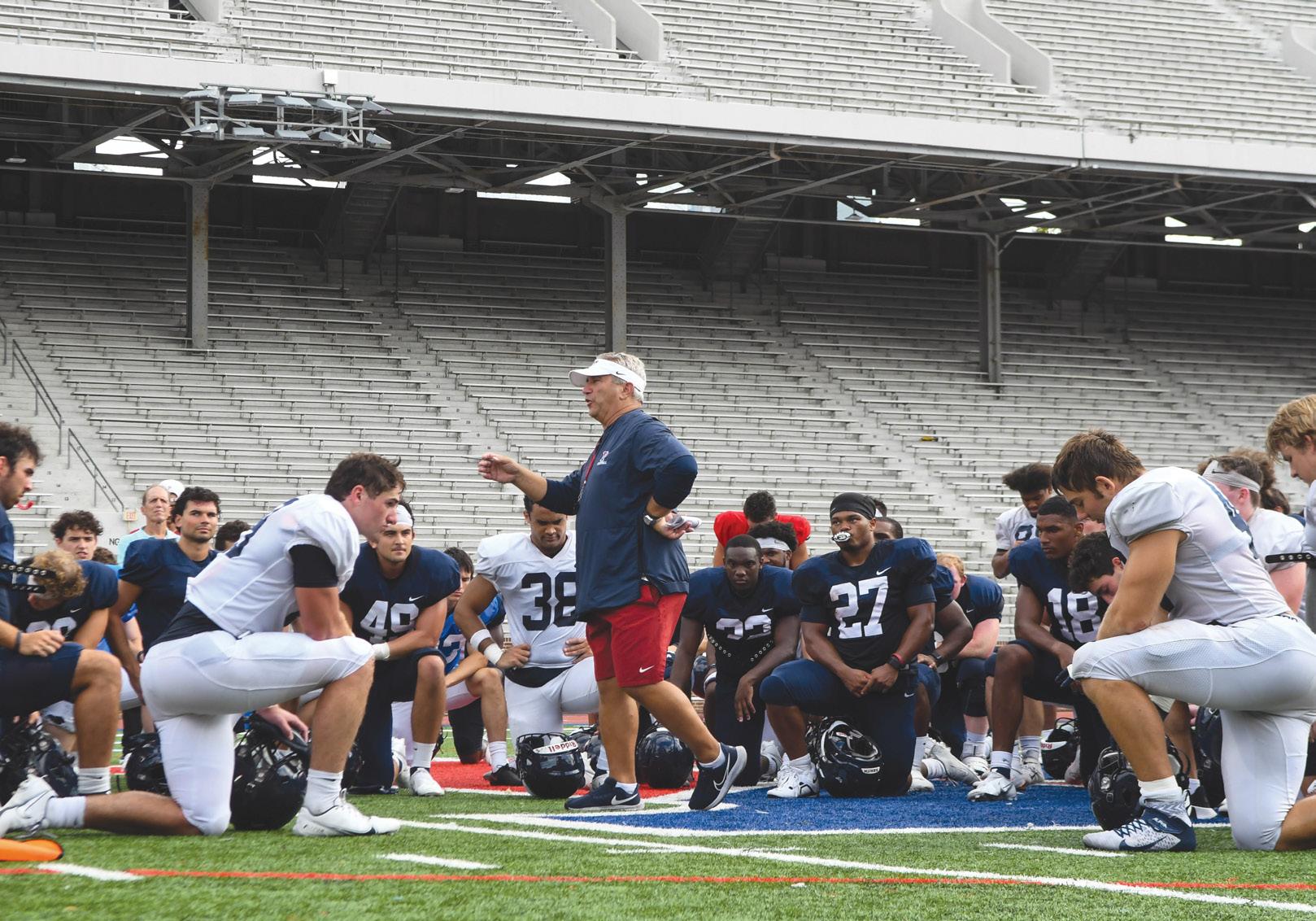





Caleb Crain, Sports Editor
Penn 27, Bucknell 14
Last week, Penn passed its first test, as the team handled Colgate easily. The offense was humming, and the defense held firm, forcing three turnovers in the process. This week, I expect more of the same. Despite Bucknell recording a win against VMI on Sept. 9 and having a bye last week, the Quakers should be able to pull off a win here. There should be an improvement on both sides of the ball, as various units continue to find their footing. I trust that Penn can play the type of complementary football that will allow them to thrive against the Bison.
Walker Carnathan, Deputy Sports Editor
Penn 20, Bucknell 10
After a victory over one Patriot League team in the season opener, the Quakers turn their
attention to another: the Bucknell Bison. The two foes have a few things in common: They both finished 2-4 in the Patriot League last year, they tied for fourth in the conference, and at the end of the week, and they’ll both have losses to Penn on their record. The story of Penn’s opening victory was the defense, and I anticipate a similar effort this Saturday. The Red and Blue brigade nabbed a pair of interceptions while holding the Raiders to just 1.8 yards per carry on the ground, and I expect more of that dominance against a Bucknell offense that has scored just 24 total points over its first two games. The Quakers will force at least three turnovers in a suffocating defensive effort, heading into Ivy play with a crisp 2-0 slate.
Vivian Yao, Sports Associate Penn 23, Bucknell 17
The Quakers should win this game and keep their red-hot start to the season rolling, although the score will definitely be closer than what most people will be expecting. Bucknell wide receiver Damian Harris has been playing lights out despite the team’s offensive troubles, so expect to see him being the focal point for the Bucknell offense, especially against a Penn defense with a stout run stopping unit. If the Red
and Blue secondary — which let up 197 passing yards against Colgate — can shut Harris down, then the win will be theirs. If they can’t, then Penn may very well find itself on the other end of the score.
Griffin Bond, Sports Associate Penn 21, Bucknell 13
In the two games that Bucknell has played this year, both opponents had around 40 rushing attempts. James Madison had 261 yards and three touchdowns on 41 carries, while VMI only managed 75 yards and zero touchdowns with its 40 carries. One team defeated Bucknell, one did not. It is pretty easy to guess which one. In 2022, opponents rushed for less than 100 yards against the Bison three times. Those three games were its three wins on the year. The script is out on how to beat Bucknell. After losing running back Trey Flowers and with multiple new starters on the offensive line, the Quakers entered this season with questions in the run game. Despite only eight attempts against Colgate, junior running back Jacob Cisneros emerged as a possible solution — finishing with 65 yards, including a team-long 18-yard carry. I expect this success to continue, and the Quakers will come away with the win.


Ansh Jakatimath, Sports Reporter
Penn 28, Bucknell 14
After a strong performance against Colgate,
I have the Quakers triumphing over Bucknell this upcoming Saturday. My confidence in this prediction is largely based on the performance of Cisneros and sophomore wide receiver Jared Richardson, who stood out in last week’s contest. However, it’s worth noting that the Bison haven’t given me much reason to be objectively confident. While they recently secured a one-score victory over VMI, their previous 38-3 blowout loss to James Madison is hard to overlook. Both teams currently hold one win in their records, so I hope for a close and competitive matchup. Nonetheless, my pick remains the same: Quakers by two scores.
Kristel Rambaud, Sports Reporter
Penn 24, Bucknell 6
Penn football has picked up right where the team left off, shaking off the cobwebs and dust of the offseason and displaying the type of defensive stability and offensive variety of last season. Junior quarterback Aidan Sayin targeted nine different receivers against Colgate, showing off a versatile offensive core that the Bucknell defense — who let James Madison put up 38 points — likely cannot keep up with. On the other hand, across two games, Bucknell has put up an average of 12 points. Up against a Red and Blue defense that got six sacks last game, the odds are not in their favor.
The Quakers finished sixth at the NCAA Championships and second at the Henley Regatta
EVAN POWERS Sports ReporterThe sun shined brightly over the water, reflecting the burning aspirations of Penn women’s rowing. With the sound of oars splashing and rhythmic chants of encouragement, the team gave everything they had on the river. The 2022-23 season featured a tapestry of emotions for the Quakers, from nail-bitingly close victories to heart-wrenching defeats. However, amid the undulating waves of challenge, the team emerged stronger, more united, and with significant accolades under their belt. This past May, the Quakers had an exemplary
performance at the Ivy League Championships, securing an impressive third place. Following that performance, Penn earned a spot in NCAA Championships in June. Over that weekend, Penn accumulated 92 points, narrowly surpassing Brown’s 91. Stanford emerged as the overall champion with 129 points, owing to their victories in both the Varsity Eights and Second Varsity Eights divisions. Washington took the second spot with 120 points, and Princeton followed in third with 113 points. Texas and Yale both secured 110 points, but Texas finished fourth due to their
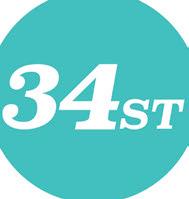





result in the Varsity Eights Grand Final. Penn ended up taking home sixth place overall.
Even though the NCAA season was over, Penn kept competing. The Quakers went to the Island Challenge Cup in August, where they came tantalizingly close to victory, falling just one win short. This chase for glory had a challenging precursor in July when they squared off against the renowned rowing team of Oxford.
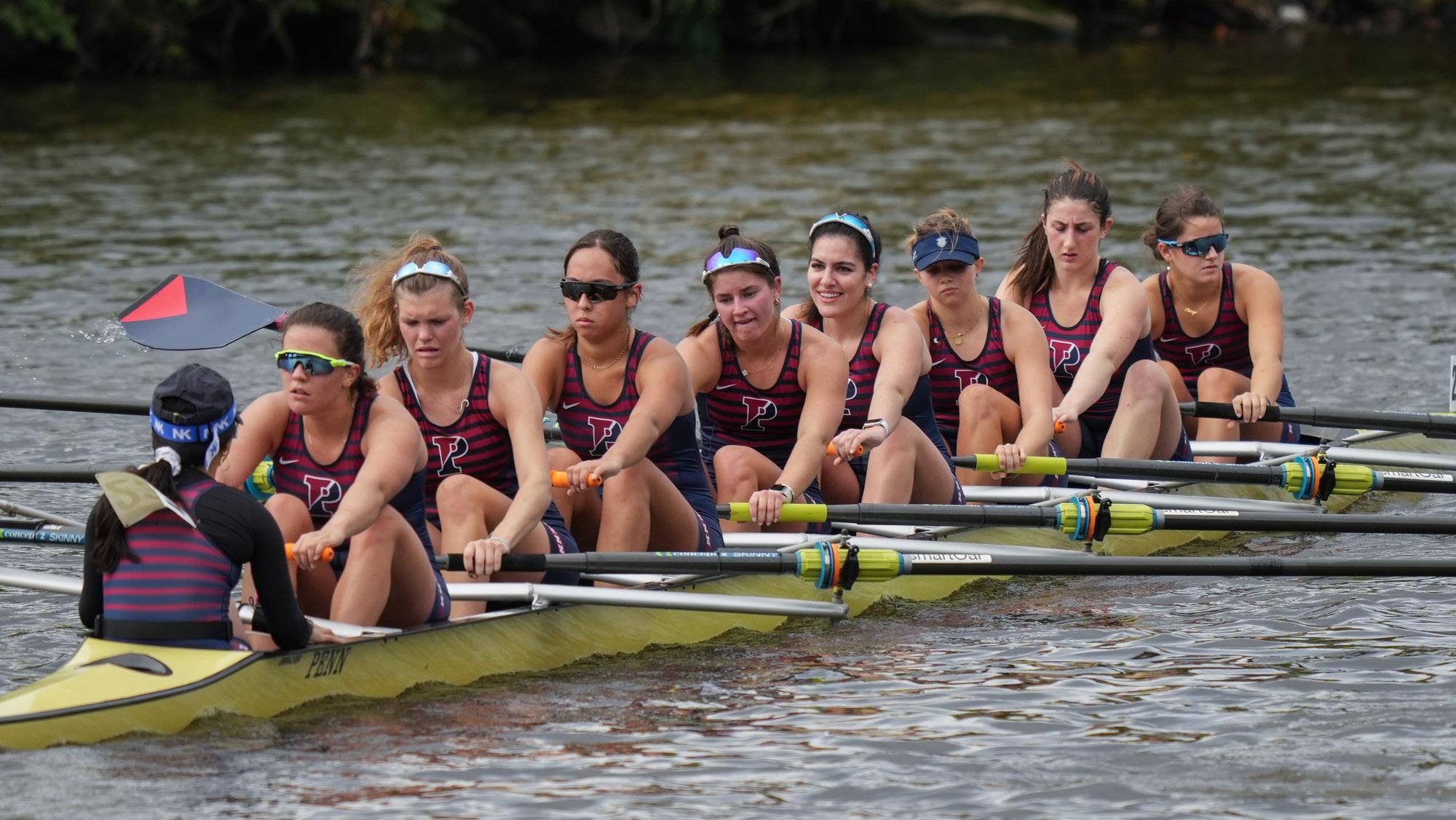

Throughout the intense race on Henley’s 2,112-meter track along the River Thames, Penn took the initial lead, reaching the arrier in 2:05.
However, Oxford Brookes overtook Penn by the next marker, reaching Fawley in 3:31, and maintained their lead thereafter. While Penn trailed by approximately half a boat’s length, they managed to close the gap slightly over the last 300 meters. Despite this effort by Penn, Oxford Brookes clinched the victory with a winning time of 7:18.
Despite coming up short on a few occasions, Penn’s late spring and summer spotlighted several shining moments that enhanced the team’s reputation.




The Quakers last played the Bison in 2021, when they won 30-6
CALEB CRAIN Sports EditorLast week, Penn football played four complete quarters en route to a 20-6 win over Colgate (0-3). But the cruel irony of the college football season is that regardless of last week’s result, the Quakers (1-0) have to do it all again for the next nine weeks. On Saturday, Penn will head back on the road to face another Patriot League foe: Bucknell (1-1). Against Colgate, the Quakers looked like a smooth football team. The offense ran for 110 yards on just 25 carries, gaining over twice as many yards per rushing attempt as the Raiders. Through the air, junior quarterback Aidan Sayin completed over 60% of his passes and threw for two touchdowns.
The defense, after allowing six points in the first half, shut out the Raiders after halftime. The Quakers forced three turnovers on downs, and added an interception — their second of the afternoon — during the second half. The defense notched six sacks of Colgate quarterback Michael Brescia and held the Raiders to four for 17 on third down.
There were some “first-game jitters,” senior defensive back Jaden Key said. “So going into halftime we had to clean up some things, make sure we were tackling the right way, and then after that just hit the ground running.”
Despite looking strong against Colgate, Penn will aim to do even better against Bucknell. With first-game kinks out of the way for the team, the team will strive to improve into who it ultimately could be.
“We made a handful of very correctable mistakes [against Colgate] that our kids have really honed in on,” coach Ray Priore said. “There’s a coaching mindset that says the greatest improvement you see is between your first game of the year and the second game. So we’re really, really harping on cleaning up all those little things that we didn’t do right on Saturday.”
This week, Penn will butt heads with the Bison. So far, they are 1-1, with a 38-3 loss to James Madison in week one, followed by a 21-13 win against VMI. Last week, the Bison had a bye, meaning that they will likely be extra rested heading into this week’s matchup.
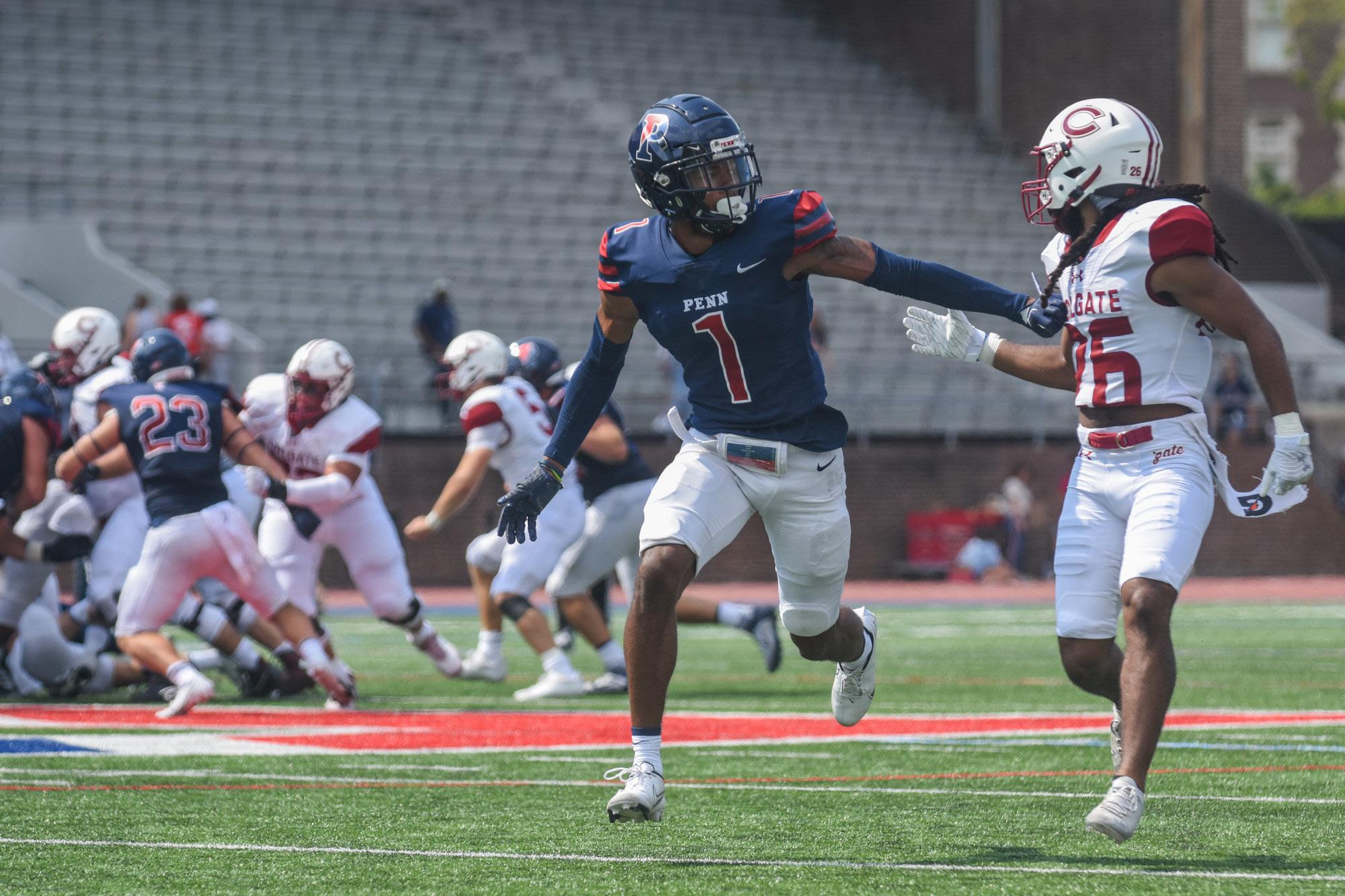
In the victory over VMI, Bucknell implemented a multifaceted offensive attack, with 173 rushing yards and 224 passing yards. Meanwhile, their defense held VMI to under two yards per carry. However, the defense did surrender a 67% completion percentage and 11 yards per completion.
“I would say they are showing some really good things both on offense and defense,” Priore said. “Their quarterback is very active, throws the ball very well and he’s very mobile which gives everybody headaches. On defense, their defensive front and linebackers have really done a nice job.” With only 10 games each year, every contest matters for the Quakers. But with the Ivy League season beginning just next weekend against Dartmouth, this week will be crucial for Penn to iron out any possible holes in the team ahead of the conference season. Even with the depth chart largely unchanged from the Colgate game, the Quakers will still likely rotate in several players.
“If you look at the statistics from the Colgate game, we ended up playing a lot of players,” Priore said. “For some people, I think the amount of reps they have may change, but I think our strength is in our depth and our ability to play as many players as we can in certain positions.”
Penn’s game at Bucknell will kick off at 3:30 p.m. on Saturday, Sept. 23 from Christy Mathewson-Memorial Stadium in Lewisburg, Pa.
Sophomore wide receiver Jared Richardson’s breakout performance was the story of the day for the Quakers
WALKER CARNATHAN Deputy Sports EditorYou never get a second chance to make a first impression.
Penn football took that adage to heart on Saturday, when the Quakers rolled into Hamilton, N.Y. and rolled over Colgate (0-3) for a 20-6 season-opening win. Leading the way for Penn (1-0) was sophomore wide receiver Jared Richardson, who racked up seven catches for 62 yards and a touchdown after recording zero catches as a freshman. Both Richardson’s performance and the Quakers’ overall dominance give the team plenty to look forward to in the season ahead.
“It was just about executing,” Richardson said of the victory. “Everybody did their job — I was proud of our guys. Now we gotta keep going.”
While the final score may indicate a smooth victory for the Red and Blue, Penn spent much of the first half shaking off an offseason’s worth of rust. While the Raiders entered the matchup
with two games already under their belt, the Quakers had not played an official snap since last November, and that time off manifested in an early lack of rhythm for the Quaker offense. While Penn was able to move the ball from the outset, they struggled to finish drives and put points on the board. The Quakers were just 3-8 on third down in the first half, including a failed third-and-three from inside the Raider 10-yard line. But luckily for Penn, Colgate’s attack was similarly stagnant. Near the end of the first half, both offenses had only a pair of field goals to show for their efforts, with the four kicks coming from an average of just under 30 yards.
“They had two games they played before us, so we had to make sure we weathered the storm early,” coach Ray Priore said. “Which our kids did a really good job of … Early on we were a little overzealous, we rushed some things, but our kids were really quick to resolve, they got their sea legs under them, and they did a great job after that.”
But all those early struggles were wiped away with a single pitch and catch. After yet another deep drive, junior quarterback Aidan Sayin dropped back and fired a pass to Richardson in the end zone, connecting for a toe-tapping touchdown. The score gave Richardson his first collegiate touchdown and gave the Red and Blue a 13-6 advantage heading into halftime — a lead they would only extend in the second half.
For Richardson, the chance to showcase his talent was the highlight of the day.
“We have playmakers all over the field,” Richardson said. “So, coming in as a new guy, nobody really knows what I can do, because it’s my first career start, first career touchdown … It felt real good.”
While the offense was gaining momentum, Penn’s defense was shutting things down. The Quaker stop troops pitched a second-half shutout, led by a defensive line that held the Raiders to 1.8 yards per carry on the ground.
The D-line was a huge advantage for Penn during the team’s 8-2 campaign in 2022, and as they look to repeat that success in the new season, the trenches will again be pivotal.
“When you’re able to get pressure with just a four-man rush, without having to blitz, that’s really, really, good,” Priore said. “We have some really good depth on our defensive line, and we were able to show that today … We were playing very fast, we were playing very fresh.”
The lone score of the second half came on a strike down the middle of the field from Sayin to senior wide receiver Maurcus McDaniel. Sayin delivered a solid performance on the day, demonstrating all the veteran savvy of a signal-caller that has been steering the ship for the better part of three seasons. Though his 166 passing yards and 60.5% completion percentage will not go down in any record books, he played a big part in the only stat that matters: 1-0.
“It feels real good,” Richardson said of the season-opening victory. “Any time you get a dub over a decent opponent, it feels great. Next week, Bucknell, another Patriot League team, let’s head into next week with the momentum that we have now.”
Next week, Penn will be on the road again for a matchup with Bucknell (1-1). From Richardson’s breakout performance to a suffocating effort from the defense, the Quakers can take lots of positives from the opener. But for all the attention that is paid to the first game on the schedule, the Red and Blue hope it is the start of something even greater.
Teevens played quarterback for the Big Green and had been their head coach for over 22 years
VIVIAN YAO Sports Associate
Dartmouth football head coach Eugene “Buddy” Teevens died Tuesday at the age of 66 due to complications resulting from a biking accident six months ago.

Teevens has been a main staple of Ivy League football over the last several decades, playing for the Big Green and later returning to the program as a coach. As a quarterback, Teevens led Dartmouth to an Ivy League title and won Ivy League Player of the Year in 1978. He would go on to spend 22 of his 30 seasons as a head coach at Dartmouth, securing himself the honor of being the winningest head coach in program history while also winning five Ivy League titles.
Despite all the accolades, what was most impressive about his career was his ability to progress the sport away from the gridiron. Teevens made massive strides toward improving player health and safety. One of his biggest contributions on this front has been implementing practice methods that help protect players from concussions and other injuries.
Teevens also placed major emphasis on technique rather than full-contact practices, leading to the creation of a robotic tackling dummy by Dartmouth’s Thayer School of Engineering known as the Mobile Virtual Player, which has been used by other college programs and multiple NFL teams.
While the Big Green’s success under Teevens often came at the expense of the Quakers, his death will loom large. His impact, which extends far beyond the playing field, has made its mark, and the Ivy League was incredibly lucky to have had a coach who cared so deeply about the game — a coach who has done so much for the progression of the game that opposing coaches can’t help but respect him.
“This is an incredibly sad and shocking time for a lot of us who have worked with and competed against Coach Teevens,” said Penn football coach Ray Priore. “He was a great ambassador for the game of football and especially for the Ivy League, and his legacy is intact despite his passing. Penn and Dartmouth have had some incredible battles over the last few decades, I was lucky enough to face off with his teams through both of his tenures at Dartmouth and got to witness first-hand his evolution as a coach. It will be bittersweet facing them next weekend and not getting to shake his hand before or after the game.”
Teevens is survived by his wife, Kirsten Teevens, and their two children as well as four grandchildren. At Penn’s Ivy League play opener against Dartmouth, players on both teams will be sporting a decal with his initials on their helmets to support the family.